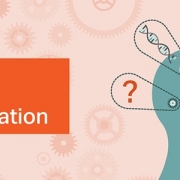HEE Genomics Programme heads to Liverpool for BSGM
Delegates engage with programme team at exhibition and auditorium session
Last week, Liverpool’s Arena and Convention Centre played host to hundreds of genetics and genomics researchers, academics, clinicians and companies, among many others, for the British Society for Genetic Medicine’s annual conference. The HEE Genomics Education Programme was delighted to play its part with an exhibition stand, a 90-minute auditorium session and plenty of updates online via Twitter.
On the stand, the team enjoyed a lively three days talking about the programme’s activities and future plans. Several of us were familiar faces to delegates, having previously attended BSGM as part of the National Genetics and Genomics Education Centre. The Centre was merged into Health Education England, within the National School of Healthcare Science, earlier this year.
Many of the enquiries on the stand related to the programme’s online courses and the upcoming MSc in Genomic Medicine, which were featured as part of our auditorium session on day two of the conference.
Spotlight on genomics education
The session began with Prof Sue Hill outlining how the Genomics Education Programme fits within HEE’s role and responsibilities. The key aims of the programme include educating the existing and future NHS workforce in genomics, supporting the work of the 100,000 Genomes Project, and integrating genomics into mainstream care for the benefit of patients. A number of key areas of work were identified, including training for specialist and generalist staff, commissioning of additional postgraduate training numbers in areas such as molecular pathology and bioinformatics, and the development of an MSc in Genomic Medicine.
#BSGM2014 Prof Sue Hill: Programme is comprehensive, covers specialist and general workforce, and offers short- and long-term provision.
— Genomics Education (@genomicsedu) September 23, 2014
The MSc was the next topic, led by the programme’s scientific adviser Val Davison. The MSc will be open to NHS healthcare professionals in England across all groups including nursing, medicine and science. The first cohort of students will commence early next year, with a minimum of 550 staff completing the course by summer 2018. Modules from the curriculum will also be made available to NHS staff as CPD courses. HEE is expecting to appoint 6-8 ‘preferred providers’, and there has been a great deal of interest from higher education institutions. Mrs Davison noted that more than 50 HEIs attended a recent open information day.
Clinical adviser Dr Anneke Seller spoke next, to showcase the programme’s online platform and available resources. This includes an awareness-raising video about genomics in healthcare, presented by science broadcaster Vivienne Parry, and two online courses: Introduction to Genomics and Introduction to Bioinformatics. Work is under way to develop the next set of resources, including a training module on consent and ethics, a series of bioinformatics workshops, and of course the Master’s programme. And there is plenty more to follow.
Bioinformatics was the theme of the final portion of the education session, first with an engaging talk from University of Exeter’s Prof Sian Ellard on the challenges and risks of interpreting genomic data, and the need for bioinformatics training. Harvard and University of Sheffield’s Prof Winston Hide took the final slot with a look at the big changes ahead for clinical staff in handling genomic information. He explained how Harvard focuses on sharing bioinformatics knowledge through online networking and face-to-face groups, emphasising the combined power of social media and personal contact. It was an inspiring note to finish on, before handing over to the audience for their questions.
A twitter feed is one of the ways we learn the latest in bioinformatics says Harvard professor at #BSGM2014
— Anna Middleton (@Genomethics) September 23, 2014
Enquiring minds
Some key themes emerged out of the Q&A session. The role of genetic counsellors was one area of discussion, and Prof Hill was keen to stress that the programme will work closely with genetic counsellors to shape workforce planning. In addition, genetic counsellors will play a key role in training and upskilling other healthcare professionals.
There were several questions about the Master’s programme, such as around the level of consistency in provision. Prof Hill said that HEE will be looking for HEIs to be innovative and collaborative, and that each provider will deliver the same curriculum that has been developed by the team in partnership with a diverse group of genomic experts.
Responsive to evidence & innovation – great! MT @genomicsedu #BSGM2014 Prof Sue Hill on future workforce, HEE & genomics revolution.
— Philippa Brice (@PhilippaBrice) September 23, 2014
Finally, many delegates took the opportunity, whether in person or via social media, to commend the programme’s aim to train and transform the workforce to harness the rapidly advancing world of genomics. It was a positive end to an insightful session.
You can stay up-to-date with the programme’s activities via this blog or by following us on Twitter. If you have any queries or suggestions, please contact the team.








